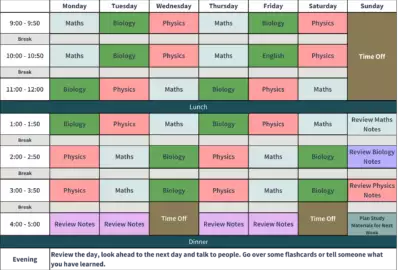
A Level Maths revision is difficult. But our experts know a thing or two about the best ways to excel.
This guide is designed to streamline your A Level Maths revision, breaking down complex topics and offering targeted strategies to maximise your study time. We’ll cover the most effective revision techniques, common pitfalls, and tips for managing exam stress, so you can approach your exams with confidence. With Ivy Education's expert insights, this blog provides a structured roadmap to help you stay on track, focus on key areas, and elevate your performance when it matters most.
First Some Quick Tips: 10 Expert Tips to Master Your A Level Maths Revision
Define Your Revision Objectives
A Level Maths covers a vast range of topics, so defining clear revision objectives is essential. Start by listing out all topics within each module—Pure Mathematics, Mechanics, and Statistics—and rating your confidence level for each one. For example, if you struggle with integration or hypothesis testing, these should be high-priority areas. Aim to break down your objectives even further: rather than “review integration,” set a goal to master specific techniques like “integration by parts” or “using substitution in definite integrals.”
As you improve in your weaker areas, revisit previous exam questions to track your progress and identify any lingering challenges. This focused approach will allow you to target your time effectively and build confidence incrementally.
Build Your Revision Plan
Developing a practical revision timetable is key, but so is making it flexible enough to account for real life.
Allocate time to each topic based on your strengths and weaknesses, dedicating more slots to areas that need improvement. Include both revision and practice sessions—consider scheduling Mondays for in-depth topic study and Thursdays for past paper practice. It’s also important to alternate between Pure, Mechanics, and Statistics topics to keep your mind fresh and prevent burnout. Remember to build in time for breaks and activities that recharge you, such as short walks or chats with friends. Plan group sessions for tougher topics like differential equations, which can benefit from collaborative problem-solving. Don’t forget to track your progress—crossing items off your plan is incredibly motivating and shows you’re moving closer to your goals!
Luckily for you, we've already created an A Level Revision Timetable Template. just for you It's FREE and ready to download, so go grab it now!
Prioritise Self-Care
Self-care isn’t just a buzzword; it’s a vital part of successful A Level revision. Try scheduling “no-study” zones each day to relax and reset, helping to prevent fatigue and stress.
For instance, set aside 30 minutes in the evening for stretching or light exercise, which not only helps release tension but also improves focus when you return to your studies. Eating nutritious meals and staying hydrated directly impact your brain function and concentration levels, so consider easy, healthy snacks like nuts, fruit, or yogurt to keep your energy up.
Self-care can also mean finding ways to connect with friends or family during this intense period, reminding yourself you’re not alone in this journey. Regular check-ins with friends can boost motivation and make the revision process less daunting.
Review Your Notes
To retain the large volume of information required for A Level Maths, consider using spaced repetition. Schedule brief reviews of your notes every few days, especially for complex topics like binomial expansions or kinematic equations. Use apps like Anki, Quizlet, or Memrise to reinforce formulas and definitions with flashcards, or make use of workbooks such as those from CGP Books, which are highly recommended by the Ivy Team!
Varying your revision methods—such as switching between flashcards, mind maps, and solving examples—keeps things interesting and helps embed concepts. Try creating a quick-reference formula sheet for each module and updating it as you master new topics. Regular, varied review will help you build long-term recall and ensure you have the fundamentals solidly in place by exam time.

Practise. A Lot!
In A Level Maths, practice truly makes perfect. Unlike subjects that rely on rote learning, Maths requires you to actively apply concepts and adapt methods to different scenarios. To build proficiency, focus on working through a variety of question types and gradually increase their difficulty. Start with foundational exercises to solidify the basic techniques, then progress to complex, multi-step problems that test your understanding on a deeper level.
For example, if studying differentiation, don’t just practice straightforward derivatives; work on real-world applications like rates of change and optimisation problems. Teaching a method to a friend or family member can also be invaluable, as explaining each step forces you to clarify your thought process, ensuring you’re not just following procedures but actually grasping the logic behind them.
Understand What You Did Right and What You Didn’t
After completing practice questions or papers, take time to understand the logic behind each answer. Identify where you went wrong and correct these mistakes with guidance from friends or teachers. Use feedback to refine your understanding and ensure you’re not just memorising steps but truly grasping the underlying principles.
Use Past Papers
Past papers are some of the most valuable resources you have. They allow you to see the types of questions frequently asked, the structure of the exam, and the marks awarded for each step. Start by completing past papers under timed conditions to simulate the actual exam, which will help you develop effective pacing. As you go through each paper, focus not only on getting the correct answers but also on understanding where you can earn method marks—even if your final answer is wrong, clear working can earn partial credit.
Pay attention to recurring themes or question types, as certain topics—like trigonometric identities or hypothesis testing—may appear frequently. Completing past papers will give you confidence in your ability to tackle familiar question styles and prepare you to face unexpected ones with more ease.
Past papers can be found on any exam board's official website. For example, Pearson Edexcel A Level Maths Past Papers can be found here.
Use Clear Explanations
When solving problems, clarity in your working-out is essential. Examiners need to understand your thought process to award method marks, so make sure your answers are clearly laid out. Avoid skipping steps, even if they seem obvious to you, and use annotations for complex steps, like “using the chain rule here” or “applying the power rule.”
This habit of clear, logical explanations not only helps you score maximum points but also reinforces your understanding of why each step is necessary. Practising clear explanations with study partners or while working through past papers will ensure that you’re fully prepared to communicate your solutions in the exam.

Learn How to Manage Your Time
Time management during the exam is crucial to maximise your score. Practise allocating time based on question marks—spend more time on questions with higher marks and avoid getting stuck on smaller, less valuable questions. For example, in a Pure Mathematics paper, don’t spend ten minutes on a two-mark question about factorising; move quickly and save your time for more complex proofs or application questions.
Set checkpoints during practice exams, aiming to complete certain sections by specific times. This will help you develop a natural rhythm for the exam and avoid last-minute rushes. Practising efficient time management will also reduce exam-day stress, allowing you to stay calm and focused throughout the paper.
Ask for Help When You Need It
A Level Maths can be intense, so don’t hesitate to seek help if needed. Your teachers, classmates, and online communities are excellent resources. If you need focused, personalised support, Ivy Education’s expert tutors can offer targeted guidance and help strengthen your preparation, building both skill and confidence.
2.0 Top
Understanding the Exam Ahead
When the Exam Begins
Stay calm and focused! Have all your essentials ready—your calculator, pens, pencils, and any other allowed materials. As soon as you turn over the paper, jot down any critical formulas or concepts that you might otherwise forget under pressure, like trigonometric identities or integration techniques. This way, they’re at your fingertips whenever you need them, so you can focus fully on each question without having to recall them from memory.

The Exam Format
A Level Maths papers often begin with more straightforward questions, typically worth fewer marks, progressing to longer, multi-step problems that require deeper reasoning. Skim through the paper at the start to get a sense of the question types and their difficulty. This initial overview can be helpful for planning your approach, as it allows you to start with the questions you feel most comfortable with while letting the more challenging problems sit in the back of your mind.
For multi-part questions, read through all sections before starting the first part. This will help you understand the overall problem and recognise connections that could inform your approach. By the time you reach the harder, application-based questions, you’ll have warmed up and built some momentum, increasing your confidence to tackle them.
If you're struggling with understanding the exam format, getting an expert A Level Maths Tutor could help demystify the exam format. Luckily, we have some of the best A Level Tutors you could ask for.
The Mark Scheme
Pay close attention to the marks allocated for each question. For A Level Maths, you can roughly allocate around a minute and a half per mark, allowing yourself time to think and show detailed working out for multi-mark questions. Method marks are crucial at this level, so always show each stage of your calculations and reasoning clearly. Even if you make an error, you can still earn partial credit for correct methods used along the way.
Ensure your working is neat and logically structured, with steps clearly separated to make it easy for the examiner to follow. Avoid crossing out any workings unless you’re entirely sure they’re incorrect—sometimes, alternative methods or partial attempts can still earn marks.
2.4Challenges of the A Level Maths Exam
One of the biggest challenges is managing your time effectively across a paper that covers a broad and demanding syllabus. Working at a steady, methodical pace will help you avoid spending too much time on a single question. A good rule of thumb is to aim for just over a minute per mark, which will allow you to keep up a balanced pace and give adequate time for the tougher questions toward the end.
If you find yourself stuck on a question, mark it clearly and move on. This will ensure you don’t waste precious time on one problem when you could be securing marks on other questions. After completing the paper, use any remaining time to revisit these tougher questions and double-check your working for legibility and accuracy. Focus on clarity—examiners need to see your thought process clearly to award marks, so take a moment to make sure everything is well-presented.
3.0 Top
Conclusion
Acing A Level Maths is all about combining a structured revision plan with a clear understanding of the exam’s demands. To recap, here are the essential steps to keep in mind:
- Define Your Objectives: Identify your weaker areas and tackle them first for a focused revision approach.
- Build a Realistic Revision Plan: Allocate time based on topic difficulty and include breaks for self-care.
- Review Regularly: Use spaced repetition and a variety of methods to keep concepts fresh.
- Practise Extensively: Work through a range of question types to build problem-solving skills.
- Master the Exam Format: Familiarise yourself with the mark scheme and time management techniques.
Remember, if you’re looking for extra support, Ivy’s A Level Expert Tutors offer tailored guidance to help you strengthen your preparation, refine your exam techniques, and approach the exam with confidence.
4.0 Top
FAQs
Concentrate on core areas like differentiation, integration, trigonometric identities, and algebra in Pure Maths; probability, distributions, and hypothesis testing in Statistics; and kinematics, forces, and Newton’s laws in Mechanics. While covering all syllabus topics is important, prioritising these high-weight areas will make your revision more effective.
Start by listing all key topics from your syllabus, identifying areas you need to strengthen. Allocate more time to challenging topics, but ensure regular review of all areas. Schedule in blocks, dedicating time for both theory review and practice questions, and include regular breaks to stay focused. Aim for a balance, setting aside time for Pure Maths, Statistics, and Mechanics each week. Lastly, keep your timetable flexible, allowing for adjustments as you track your progress.
Of, you can just use ours, because we've already done all of that for you!
Consider using resources like the Pearson Edexcel or Cambridge textbooks for A Level Maths, which cover Pure Maths, Statistics, and Mechanics in depth. Websites like Physics and Maths Tutor, Integral Maths, and ExamSolutions provide excellent practice questions, video tutorials, and revision materials tailored to A Level content.
To boost problem-solving skills, regularly practice past papers and challenging questions, especially those requiring multi-step solutions. Break down problems into manageable steps, and focus on understanding the underlying principles rather than just memorising methods. Discussing solutions with classmates or a tutor can also help refine your approach.
Use spaced repetition techniques with flashcards to regularly review key formulas. Create summary sheets for each module and practice applying formulas in different types of problems. Mnemonics or visual aids, like formula maps, can also help make retention easier.
Allocate your time based on the marks for each question, spending just over a minute per mark. Work through the paper methodically, tackling easier questions first to build confidence, then circling back to more complex problems. Practising past papers under timed conditions can also improve your pacing.
If a question seems challenging, don’t spend too long on it right away. Mark it and move on, completing questions you’re more confident about first. If time permits, return to the difficult question later. This strategy helps you maximise marks without losing time.
Combat anxiety by practising relaxation techniques like deep breathing and visualising a calm setting before the exam. Trust in your preparation and approach each question step-by-step. Staying focused on your process, rather than the outcome, can help you stay grounded and perform at your best.
Other Articles

What are A-levels?

Hardest A Levels 2025

A Level Grades Explained











